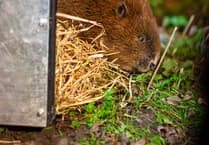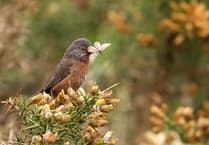Farnham Beekeepers Association (FBKA) is calling on Surrey and Hampshire residents to look out for Asian hornets and their nests.
With around 42 nests discovered this summer, FBKA predicts it is now “inevitable” these invasive predators will reach further across the south east.
Between 2016 and 2022, 16 Asian hornet nests were discovered and destroyed; so far, 42 nests have been discovered in 2023 alone, mainly in Kent and the south east, with further sightings being tracked by the National Bee Unit (NBU) indicating they could now have become established in the country.
Asian hornets are most active between April and November, peaking in August and September, and are inactive over the winter.
Julie Trice, Farnham Beekeepers Association’s Asian hornet coordinator, said: “The Asian hornet is a looming ecological disaster for the UK. The past few years have been increasingly difficult for all pollinators with pesticides, herbicides and the change of land use together with the loss of habitat – but it is beyond devastating that we are now seeing the numbers of Asian hornet nests increase dramatically in Britain.
“This is an invasive species that our eco-system is ill-equipped to deal with. Our pollinators, of all kinds, do not have any defences against them and our bee hives are effectively Asian hornet food gathered handily all in one place.”
Asian hornets are an incredibly destructive invasive species and specialise in preying on honey bee hives. The hornets ‘hawk’ the front of target bee hives, killing honey bees, and feeding them to their young. One Asian hornet alone can kill 50 honey bees per day, and a group of them will ‘hawk’ outside a hive entrance, decimating the bees, meaning it can be destroyed or irreparably weakened to the extent it cannot survive.
Each established Asian hornet nest has been estimated to eat around 11kg of pollinators and other invertebrates per year.
Now, from one queen accidentally introduced in 2004, there are over half a million nests annually in France alone.
Looking at the situation in Belgium, which has a similar climate to Britain, in 2020 the number of nests was at a similar level to what has been discovered in the UK this year and by 2022 there were more than 3,000 – showing what could happen in the UK if action is not taken immediately.
Julie added: “This is a desperately perilous situation for honey bees and other insect life. The situation is urgent. That’s why I’m calling on everyone to be vigilant, to be aware of and report any Asian hornet sightings.
“We are now extremely concerned they will spread throughout the UK, and it is therefore vital to destroy any nests before they can send out new queens at the end of the summer. The average nest can put out 350 queens to hibernate and then start nests the following spring.
“They are a very successful an adaptable insect and we must take every step to remove nests before they can establish themselves further.”
How to identify an Asian hornet
You can identify an Asian hornet by its very distinct markings – they’re slightly smaller than a European hornet, which is two or three times the size of a common wasp, and are black with distinct yellow lower leg and a prominent yellow stripe on the forth segment of the abdomen.
Asian hornets pose no more of a threat to humans than our native hornets or wasps when away from their nests. However, they are highly defensive of their nests when they perceive a threat and so nests should never be approached.
If you think you see an Asian hornet or nest, you can:
- Take a photo on your phone for identification and report it by email on the Asian Hornet Watch App, which is available on iOS and Android.
- Each area’s Beekeepers’ Association has an Asian hornet coordinator who can advise or help with identification, which you can find by searching ‘Asian Hornet Action Team Map’ on Google. The blue pins are co-ordinators, the red pins are verifiers.
Reporting a possible sighting of an Asian hornet is quick, free and easy and has the potential to make a huge difference in the fight against this invasive species.





Comments
This article has no comments yet. Be the first to leave a comment.